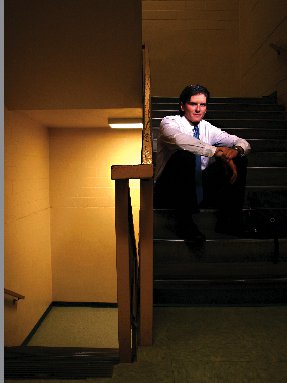
Jeff Osborne
University of Central Florida, Orlando
B.S. in liberal studies, M.S. in health-care administration
On a warm late-spring morning at Chickasaw Middle School, students in Jeff Osborne's eighth-grade science class have finished making DNA models using Twizzler sticks for the double-helix "ladder" and gum drops for the nucleotides. They've answered questions written on the chalkboard, been praised, corrected, and, on occasion, mildly scolded. Now they're filing toward the cafeteria, as Osborne heads to the teacher's lounge.
A former radiology imaging specialist who planned to go to medical school, the 25-year-old native of Titusville, Florida, was studying ethnic and racial barriers to receiving quality health care when he saw a TV commercial for Teach for America. It struck him that the obstacles to both education and health care were often similar: low income, language barriers, lack of access to resources, a value system that places a low priority on education. "That sparked my interest," says Osborne.
His first week, he recalls, "was kind of weird. I sort of mumbled and stuttered. I introduced myself to my first student as 'Jeff,'" he adds with a smile. But soon Osborne adjusted and, looking back over the school year, he says today, "I think I've helped some students overcome problems. One in particular comes to mind. He didn't like me, and I didn't care to have him around disrupting the class. I stayed on him every day: 'Tuck your shirt in, take your hat off, get to class, do what you're supposed to do.' Then I started going to the gym and shooting hoops with him and I think he began to see me in a different light. He started showing more respect for me, and I did for him."
As for students with whom he still struggles, Osborne says, "I can narrow it down to one girl. She brings me to tears. She's one of the brightest students in the school, but every day it's a constant battle. She either comes in and wants to sleep, or to argue — and then sometimes she'll get to work, answer questions, and know everything. Outside influences get her off task. I try to work with her as best I can."
On the walls of his classroom are hand-lettered signs that say "No Excuses" and "If you are not prepared to be the very best, you are in the wrong place." Those signs, obviously, are designed to motivate students, but they also represent Osborne's philosophy. "I was passionate about never receiving less than an A, and I found it very hard to accept a B. I don't like to fail, that's what it is, and that makes this job difficult, because I see failure here on a daily basis."
Though at this point he doesn't envision teaching as a long-term career, he's committed to helping his students prepare for high school and enter college. "My heart is for the success of these children, to help them achieve great goals. And oh yes, they have goals — to be a pharmacist, doctor, lawyer, basketball star. With the support of Teach for America, and the great teachers at this school, I can help guide them ahead."
